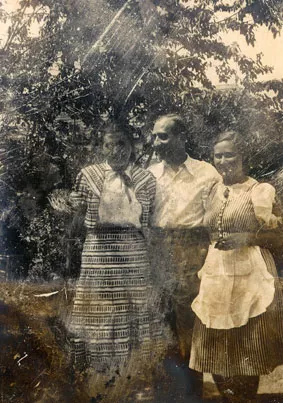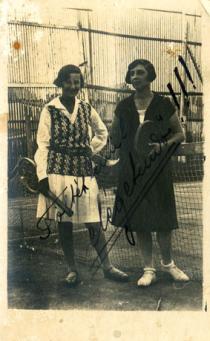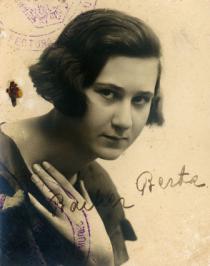Sandor Bacher with his wife and Bella Steinmetz
This photo was taken in my yard. This is my sister-in-law, my brother and me. This pinafore dress looks like the Tyrolese ones. The Tyrolese have a speacial dress too, a ‘deirindli’, rather Saxon. But this is not a Hungarian word. I wore this pinafore dress at home. A little camisole, white blouse, I don’t know how colored it was. This is my brother in the yard. For sure. He was visiting us. This was taken in the 1930s. My husband had a camera as well. Perhaps he took this photo.
As grown-ups my brother and I adored each other. He had problems with women, because he was a lady-killer. 'I'm in trouble, dear Bellus, Emilia is pregnant.' He was a clerk, he didn't have money, and the woman blackmailed him that she was pregnant, but in fact she wasn't. So I gave him money for the abortion.
My brother was sent to study to Vienna. After he came home from Vienna, my brother was employed at an enterprise, next to daddy, but daddy never wanted his son to be close to him. That is he never wanted to grant him backing. My brother was everywhere: in Szeben, there was a factory next to Szeben, the same rich man owned it, the place was called Talmacs [Talmaciu in Romanian], where the factory was, it was close to Szeben. So he went to Szeben every weekend. It had the great advantage that it was a completely German town. And my father asked the management - as my brother was persistent in his will to work in the wood industry - to send him to learn all the branches of this profession, starting from felling the trees to the shipping. Thus he was in Galati and Constanta too. He got back step by step, so when my father was in Toplica, he worked in Gyergyovarhegy. And after my father got ill, he couldn't go on, they exchanged them, my father moved back to Gyergyovarhegy, and my brother took his place. He wasn't appointed as a manager, yet he fulfilled my father's duties. My poor father died there in Gyergyovarhegy, in 1938, he got a heart attack. At that time I was married already in Marosvasarhely. Daddy visited us two weeks before. War-related troubles had already begun. In 1938 we were having fun here, we were dancing, but the war had already begun.
He was taken in 1942 from Gyergyovarhegy to Ukraine. He was already married. I didn't even hope that he would survive, but he came home. I couldn't have imagined meeting him again, that he would resist, because he spent twelve months in Ukraine, in hell. And he barely was home for five months, and in 1944 they took him to Auschwitz. He was a thin, meager man. So I came home very sad. I came home in summer. I knew nothing about him. He was in Auschwitz, then in several concentration camps [forced labor camps] to work.
His wife was a young woman from Nagyvarad, they took her to Riga, the capital of Latvia. People still hoped there that the Germans would win. So the Fuhrer from there received the command to shoot all the concentration camp.
I was home for several months, I mourned already my poor brother, I buried him in my heart. Once, it was around the middle of summer, I was going to work, when a stranger comes to my place from somewhere the countryside. He was a Jew from the surroundings, he knew the town. I didn't know him, he didn't know me either, but my brother explained him: 'Go there, look for this person.' He explained him where our house was, he told him my maiden name and my name after my husband. He found me at once. 'I bring you news about your brother, he is in Germany, he works in a factory, and he doesn't want to come home.' My brother knew that my mother wasn't alive, and because he thought too about me - well, I was a young, protected child, though he knew I was a sportswoman - that I wouldn't survive Auschwitz or working in a factory. He was in a place, where a group of women worked in the wood, at logging. Imagine women, like we are, chopping wood, in such a weather, with 'druzba'… [Russian chain-saw]
So women didn't have the slightest chance to survive. My brother didn't want to come home at all. I was very desperate. He found employment in Germany, in a factory, and stayed there. A friend of him too stayed there. 'Let's not go home, it's useless. Let's start a new life!' Especially that he spoke German perfectly, it wasn't a problem for him to do every kind of work. He felt he had nothing to come home for: 'I have no wife, Bella - that's me - won't resist, I have no mammy, Bella's husband died.' 'And one night - he says - I felt I had to come home.' So I arrived home around June, and he stayed there until the end of October, one morning he got up and said: 'I'm going home though, perhaps Bellus is alive.' In November he just stepped in one day. The poor man, how bad he looked like… in an awful clothe, shabby, famished. The trains didn't run then [as they do now]. So he related me that one night he dreamt that maybe - as he knew me as a fit girl, who has such strength of will -, maybe I'm alive after all. And he came home.
































